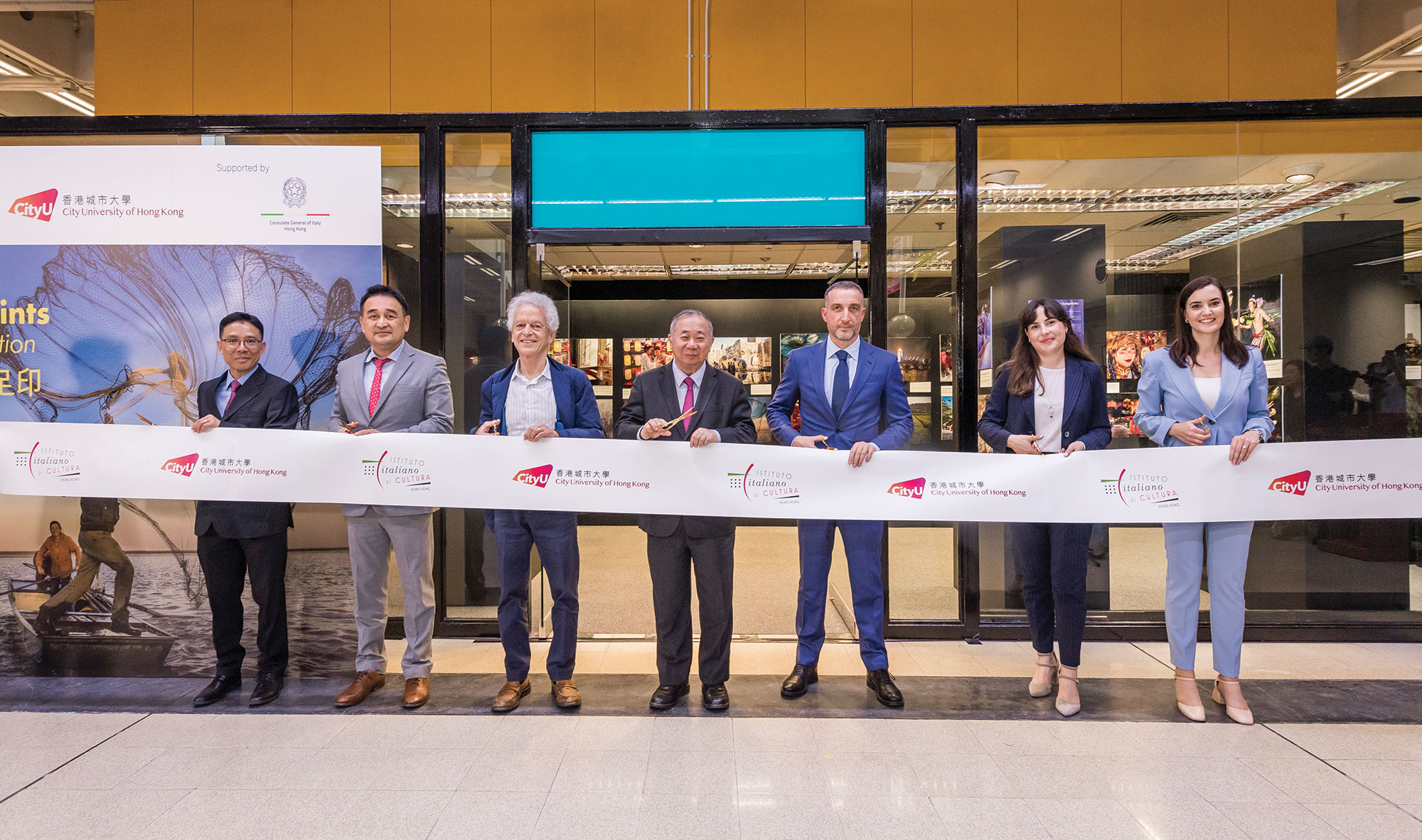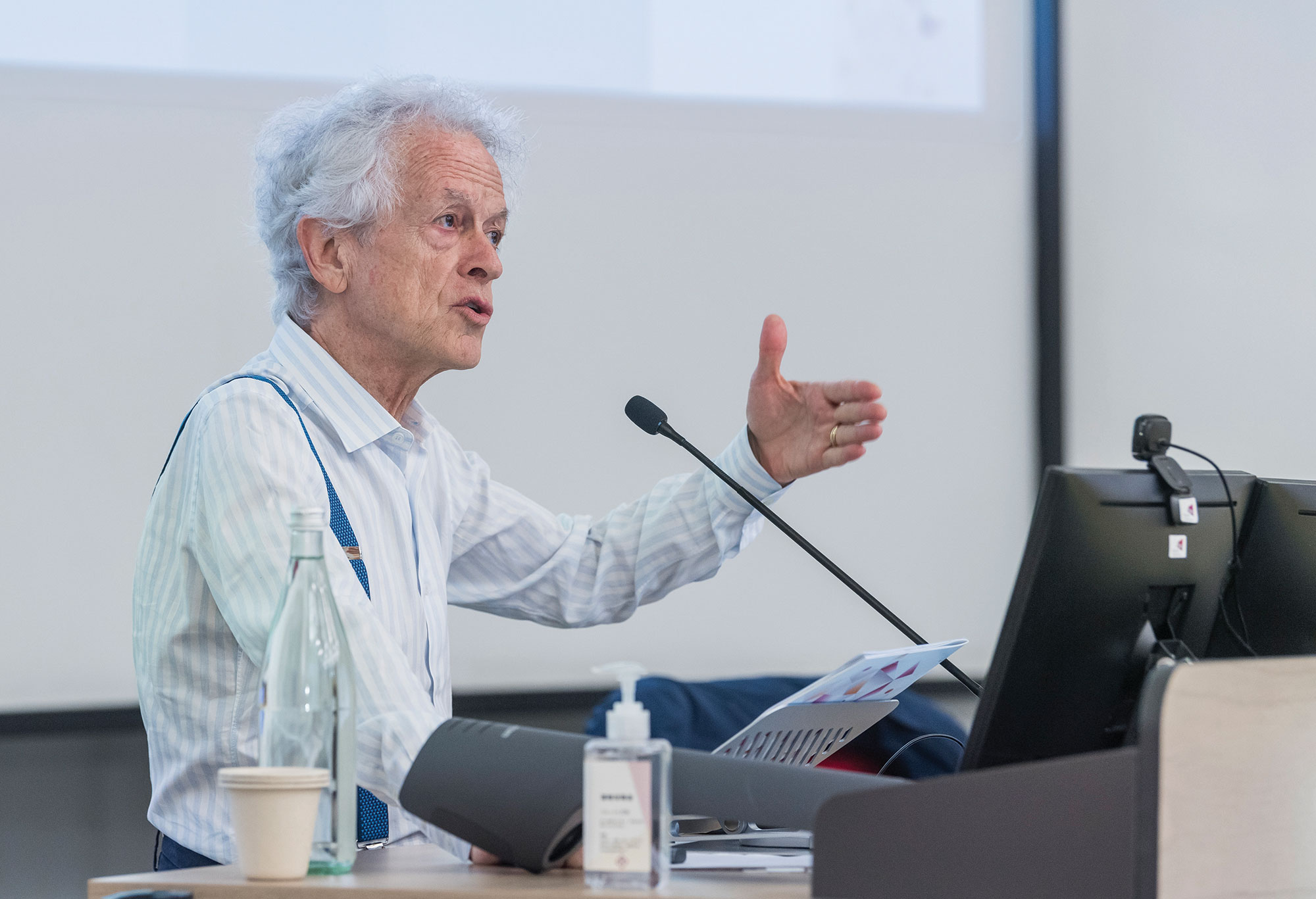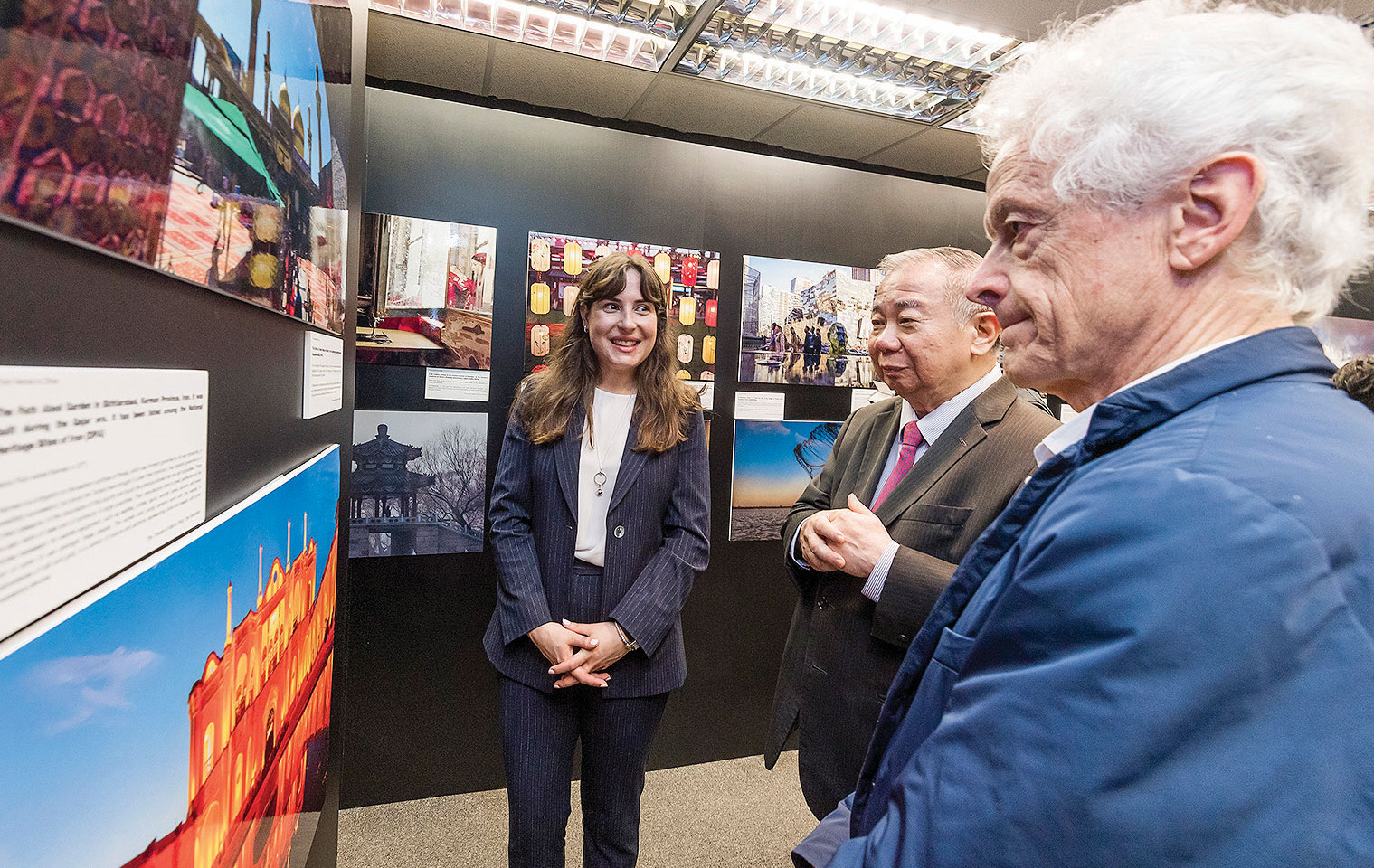Exhibition and Lecture Trace Marco Polo’s 700-Year Heritage
In collaboration with the Italian Cultural Institute in Hong Kong and Macau and the Consulate General of Italy in Hong Kong, CityUHK’s College of Liberal Arts and Social Sciences co-hosted a series of events marking the 700th anniversary of Marco Polo’s passing
The distinguished guests, including (from left) Prof Alfred Ho, Prof Li Wen-jung, Mr Federico Rampini, President Freddy Boey, Mr Carmelo Ficarra, Ms Alice Fratarcangeli and Ms Antonietta Cornacchia, inaugurated the photo exhibition “Marco Polo and His Footprints”.

Rampini shed light on the intellectual exchanges shaped by the commercial and travel activities in Western history.
Seven hundred years have passed, but the legacy of Marco Polo, the fabled Venetian merchant and explorer, remains a quintessential emblem. He represents the unbreakable thread that binds China and Italy, forever intertwined in a resplendent tapestry of heritage and tradition.
Tracing the footsteps of Marco Polo, the College of Liberal Arts and Social Sciences (CLASS) at City University of Hong Kong (CityUHK) has joined hands with the Italian Cultural Institute in Hong Kong and Macau, as well as the Consulate General of Italy in Hong Kong, to co-organise a series of events commemorating the 700th anniversary of his demise. It is also part of the festivities celebrating CityUHK’s 30th anniversary.
A Visual Portal to the Road Travelled
First, the photo exhibition “Marco Polo and His Footprints”, curated by the Italian news agency ANSA, unfurled its artistic splendour on 26 March 2024. This visual journey served as a portal, enabling visitors to traverse the hallowed paths tread by Marco Polo and delve deep into where he once left his footprints. The exhibition welcomed all CityUHK members and public visitors, and ran until 14 April 2024.
During the opening ceremony, Professor Freddy BOEY Yin-chiang, President of CityUHK, delivered the opening speech. He emphasised that Marco Polo’s significance extended beyond connecting two geographical regions; he also bridged two civilisations. “Today, we celebrate the fact that Marco Polo is now better known than ever before, as he willingly brought one civilisation back to another,” Boey remarked.
Ms Alice FRATARCANGELI, Director of Italian Cultural Institute in Hong Kong and Macau, and Mr Carmelo FICARRA, Consul General of Italy in Hong Kong, also delivered their opening remarks, providing prologues of both the exhibition and the public lecture.
With a joyous ribbon-cutting ceremony, the honourable guests officially commenced the inaugural event of the Marco Polo celebratory series.
Unearthing 700 Years of Pivotal Legacy
In concert with the exhibition, a public lecture titled “Marco Polo 700 Years Later” was also organised on the same day, with over 100 guests, faculty members and students in attendance. This event, featuring the renowned writer Federico RAMPINI, sought to delineate the profound significance of this revered voyager in the annals of Italian and Western history.
Professor Diego FOSSATI, Associate Professor of CityUHK’s Department of Public and International Affairs and one of the organisers of the Marco Polo events, first outlined the activities available in the series. Professor Esterina NERVINO, Assistant Professor of CityUHK’s Department of English (EN) and a co-organiser of the Marco Polo events, then emceed the public lecture and welcomed the speaker.
Drawing insights from several historical figures and phenomena, Rampini identified the intellectual dialogues between the East and the West facilitated through commerce and travel. He cited examples such as the Silk Road, the Mongol dynasty and Italian priest Matteo RICCI, illustrating Eurasia’s far-reaching impact on science, ideologies, religion and art.
In a thought-provoking conclusion, Rampini noted the ongoing global dispute and turbulence, affirming that the world should embrace the core values embodied by Marco Polo to foster advancements and discoveries. “Let us strive to rebuild some degrees of openness and curiosity that we can learn from Marco Polo,” he concluded with a hopeful message.
The floor was opened for questions after the talk. The audience inquired about the historical evidence and literature concerning the legitimacy of Marco Polo’s voyage. Rampini further clarified the myths and cultural exchanges surrounding Marco Polo, enriching the attendees’ understanding of the pivotal heritage that the traveller had contributed to the world.
During the closing remarks, Professor Alfred HO, Dean of CLASS, extended his gratitude to Rampini and all those involved for delivering a meaningful event on Marco Polo, as it perpetuated the importance of research in humanities and social sciences. “In just 60 minutes, we embarked on a journey spanning several centuries, regions and civilisations to contemplate the past, gain insights for today and envision the possible future,” Ho said.
Extensive Cross-Cultural Programme
As a hub for Sino-Overseas exchange and dialogue, CLASS has actively involved its faculty members in developing a cross-cultural study programme for secondary schools. This programme comprises three riveting talks covering several humanities and social science topics.
In the first talk “Shells and Ships: Some Things Only Known to Marco Polo”, Professor YANG Bin of CityUHK’s Department of Chinese and History discussed Marco Polo’s travel history and relevant controversies.
Next, Professor Jason HARDING, Head of EN, explained how Marco Polo’s Il Milione served as a significant source of inspiration for Italo CALVINO’s Invisible Cities in his talk titled “Marco Polo and Imaginary Cities”.
Last but not least, Fossati delivered a talk titled “Marco Polo’s Adventures in Southeast Asia”. He shed light on the fascinating cross-cultural and diplomatic aspects of Marco Polo’s expedition in the region.
Secondary schools were invited to book an exhibition visit alongside these engaging talks as part of the tailored post-event outreach and shared initiatives.
All in all, it is evident that the series of Marco Polo events have coalesced into an intellectual and cultural exploration—one that unceasingly inspires generations both present and future.




